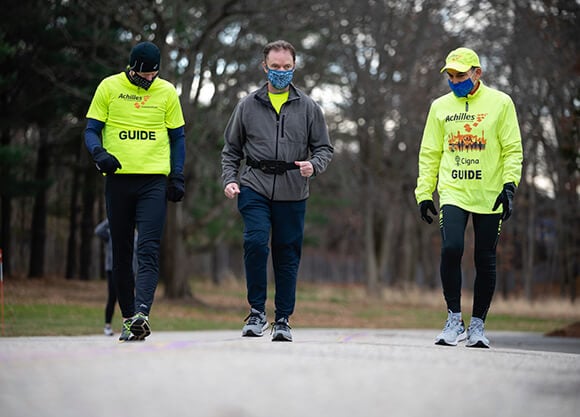
New technology tested at Quinnipiac helps blind athletes run independently
December 08, 2021

December 08, 2021

And it was wonderful.
“This could change running for a lot of people,” McCollum said, a nod and a smile affirming his assessment. “I felt very comfortable and pretty much in control.”
For McCollum and two other blind runners Saturday, a new technology developed by Google and tested at QU enabled them to run independently with special headphones and a mobile app that tracked the line and guided the runners with different sounds.
Although this machine-learning research is still in development, Google’s Project Guideline has emerged as a transformative technology for blind and low-vision people, said Erin Spaulding, president of Connecticut’s chapter of Achilles International, a global organization that supports athletes with different abilities and helps them exercise, compete and make social connections.
Spaulding and Sarah Ferrero, a clinical associate professor of physical therapy, have collaborated many times, both at Quinnipiac and with Achilles.
In fact, Spaulding learned about the access road where the Project Guideline testing took place after Achilles participated in QU's Walk and Roll 5K a few years ago.
Quinnipiac is one of 21 sites across the country where Google's new technology is being run through the paces. Other sites include Nashville, Phoenix, Las Vegas, Boston and New York City.
“We are honored to be an approved testing site for Google Project Guideline,” said Spaulding, who is also an Achilles athlete. “Achilles International and Quinnipiac University have had a longstanding community partnership.”
For Judy Potter, a blind athlete who completed a triathlon in 2015, the sounds from the Project Guideline app were critical to help her stay on the line or close to it. The Achilles runners each tested two platforms with different sounds to assist them with navigation and self-correction.
“They go from ear to ear, and they get louder. You definitely know when you’re off the track,” said Potter, her dragonfly earrings giving her some extra wings on this morning. “When you get back onto the middle [of the line] where you’re supposed to be, it just mellows back out again.”
Beth Haydu, who served as Potter’s support runner, also marveled at the technology: “I hardly said anything to her.”
For Liz Bottner, a goalkeeper for a blind hockey team, the Project Guideline app will enable her to enjoy sports and other activities even more.
“I’m really excited about the possibilities this technology can bring,” Bottner said. “I still think that it needs some work and fine tuning, but it’s pretty amazing.”
Quinnipiac students AJ Roberts ’22, MA ’23, and Grace McGuire ’23, MS ’24, covered the Project Guideline testing for Ability Media, a School of Communications platform that looks to educate and inform the public about the unique skills and potential people with disabilities can offer.
Clever Streich '23, MA '24, who interned last summer at the Connecticut chapter of Achilles International, put Spaulding in touch with the School of Communications and Ability Media.
“Google and Achilles share the goal to make walking and running more accessible and inclusive for blind and low-vision individuals, and we are thrilled that Ability Media will shine the spotlight on this exciting opportunity,” Spaulding said.
Chris Roush, dean of the School of Communications, agreed.
“The goal of universities around the world is to educate people and fix issues in society that are important,” Roush said. “Working with Achilles International and Ability Media, the School of Communications aims to draw attention to the underrepresentation of people with disabilities in the media.”
Quinnipiac Today is your source for what's happening throughout #BobcatNation. Sign up for our weekly email newsletter to be among the first to know about news, events and members of our Bobcat family who are making a positive difference in our world.
Sign Up Now